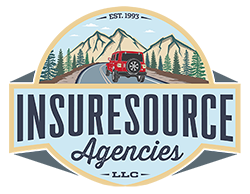On the way to your first day at work, you get pulled over by a cop because you ran a stop sign you didn’t see. She already knows your car doesn’t have insurance, just by running the plate through the DMV database she can access on her computer. You tell her your story. It’s not that she doesn’t care; she has to protect the rest of us from uninsured drivers. She gives you a citation.
You must now find another way to get to your new job. When you arrive late, you explain to your new boss what happened. Hopefully, she’s understanding and doesn’t fire you before you get started.
Lonely Car in Impound
Meanwhile, the tow truck parks your car in an impound lot.
On your lunch break, you call the police department to find out where your car is stored. They instruct you to come to the station with proof of insurance and pay the release fee, which varies between $50 and $250 depending on the city in Oregon where you were stopped. You know you can’t afford that. You beg them to at least tell you which tow company it is. You get lucky that they tell you, but they remind you that the tow company can’t let you take the car without insurance and a release certificate.
After hanging up, you hitch a ride from a co-worker you just met to drop you off at the tow yard. They are closed. You take the bus home.
Everyone Wants Money
The next day, you take the bus to work. On your first break, you call the tow company and ask how to retrieve your car from the impound. They tell you the same thing the cops told you. You ask for your options since you can’t afford to buy the insurance, pay the release certificate, and pay their whopping $500 tow and storage fees. The nice man tells you to bring in the title and sign it over. They will sell your car at auction to cover the expenses. If there is any money left over, they’ll give it to you. If you still owe them money, they’ll bill or sue you, depending on how long it takes up storage space. You get angry, hang up, and ignore the situation.
The SR22 Problem
After two months of taking the bus to work, you finally have enough money to buy another car. About the same time, you get a letter in the mail from the Oregon DMV stating that you have 30 days to obtain an SR22. You call around for auto insurance quotes for your new car and ask for an SR22. The price is $150 a month for liability insurance with SR22. That’s more than you have after buying the vehicle. You ride the bus for the next two weeks, leaving your new car parked at home. Smart move. With the next paycheck, you buy the insurance, and the agent faxes or emails the SR22 to the Salem, Oregon DMV just in time to avoid suspension of your driver’s license.
Back on Track?
Now you are back on track—driving to work, with insurance, in your new car. One day, when you get home, you find a letter in your mailbox from the tow company stating that they have taken you to court and won a judgment against you for $ 2,600. What? Why? You call the tow company. They tell you that you should have brought in the title, and the amount would have been a lot less. They had no choice but to file a lien on the vehicle and wait the required time for the release of ownership. Your car was taking up their space in their impound lot, for which they charge $50 a day. They didn’t get enough at auction to cover all their expenses and legal fees. The cost after the sale was $2,600. Now you are outraged and hang up.
A month later, you notice that your paycheck is short, and you speak with someone in the human resources department. They inform you that your wages will be garnished for $2,600, plus interest and fees, over the next three months until the debt is satisfied.
The Moral of the Story
In other words, don’t drive a car uninsured unless you have about $1,000 to get it out of impound.
Oops, you left something out. You had to go to court to make arrangements to pay the $390 in fines for driving uninsured and running the stop sign.
